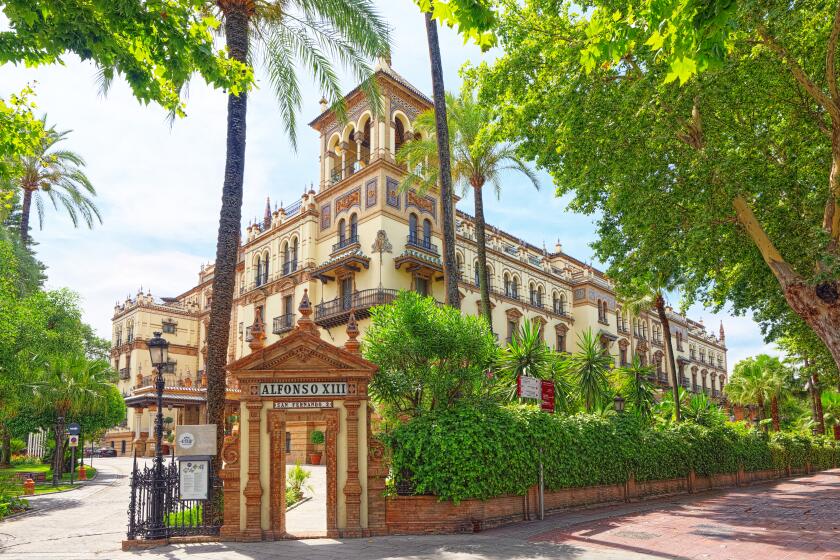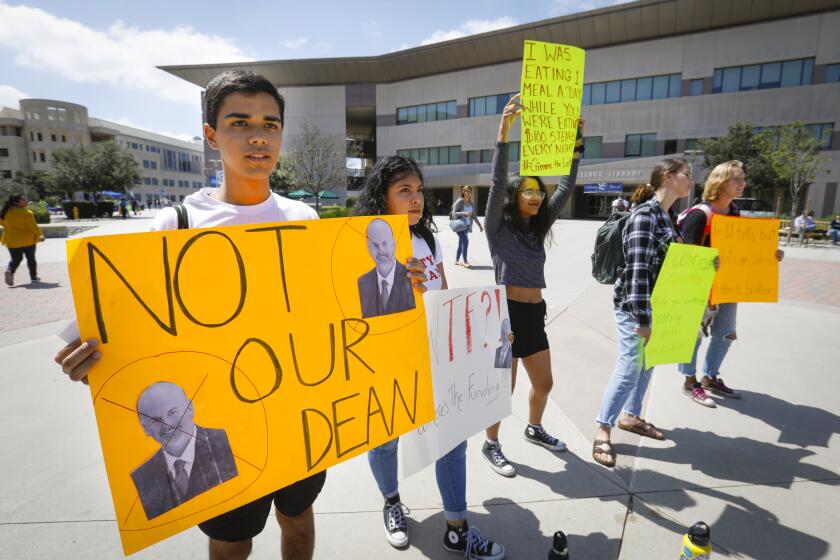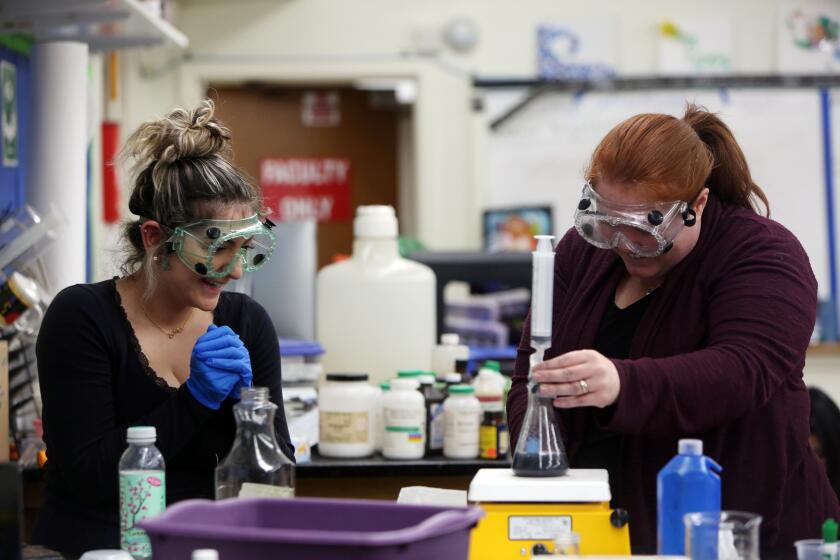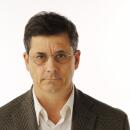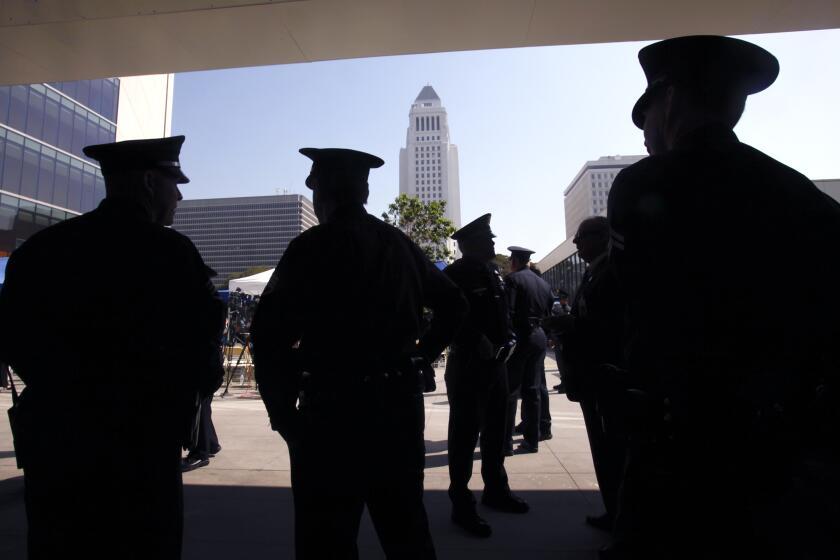Cal State San Marcos audit shows cross-country road trip, Guns N’ Roses show and phantom dinner guests
SAN DIEGO — A former Cal State San Marcos dean submitted dozens of fraudulent hospitality claims, filed duplicate expense reports and made up dinner guests to collect improper reimbursements, a long-awaited investigation released Thursday concludes.
On one day he attended an NFL game and watched a Guns N’ Roses concert, calling it college business, the report said.
In total, Michael Schroder racked up at least $41,000 worth of unallowable expenses between July 2017 and June 2019, investigators at the California State University chancellor’s office said.
His dismissal by the university was announced late Wednesday.
“We investigated allegations that the dean of extended learning at California State University, San Marcos inappropriately used his expense account for personal meals and events, claimed business expenses for meals with individuals with whom he never met and spent excessively on international travel,” the report states. “We substantiated all of the allegations.”
President Ellen Neufeldt declines to discuss specific reasons for the changes.
The 28-page investigative findings lay out a sweeping breach of Schroder’s fiduciary duty to safeguard and steward public funding. But the Cal State report also limited its review to the former dean, who was not alone in spending university money on lavish meals, personal drivers and five-star resorts.
The San Diego Union-Tribune reported last year that former university President Karen Haynes and several other senior administrators also stayed at overseas hotels costing as much as $760 per night, hired chauffeur-driven limousines and used school resources for expensive dinners and fine wines.
The chancellor’s office declined to answer questions Thursday about why spending by other Cal State San Marcos administrators was excluded from its eight-month investigation — or whether Chancellor Timothy White would seek to recover any of the allegedly misspent funds.
Cal State San Marcos spokeswoman Margaret Chantung said in a statement that the campus’ own investigation had included a review of one year’s worth of spending by Haynes and other administrators.
“The scope of the [Cal State San Marcos] internal review included all reimbursements from vice presidents and presidents during the 2018-19 fiscal year,” she wrote. “While we discovered instances of travel spending that fell outside CSU policy, we did not find any evidence of fraud.”
She also said school officials have not decided whether to try to recoup any funds from Schroder — or others — or whether the university would refer the case to criminal prosecutors.
Former president, many others favored private drivers, fine dining
“We will be reviewing all of our options,” she said.
Schroder has not responded to multiple requests for interviews about his travel expenses.
Eduardo Negron, a political science major who organized a protest on campus last fall after Schroder’s spending was first disclosed, was less than satisfied with the audit results released Thursday.
“It took the university eight months to know what we have all known since the beginning: that former Dean Schroder stole tens of thousands of tax dollars to satisfy lavish whims,” Negron said. “The investigation still fails to fully scrutinize the misuse of funds by former Provost [Graham] Oberem, former President Haynes and dozens of other administrators.”
Oberem, the administrator who approved many of Schroder’s expense reports, retired from his position June 30, just ahead of the chancellor’s investigation. He is still on the university payroll as a faculty member.
Adam Day, executive of the Sycuan Band of the Kumeyaay Nation and chairman of the Cal State Board of Trustees, said he is grateful to the whistleblower who alerted university officials to the spending.
“I am outraged to see the findings in the audit,” he said in an email. “This type of fraud and abuse of the public trust and tax dollars is inexcusable.”
Day commended Cal State San Marcos President Ellen Neufeldt for her handling of the case and said he asked that the report be sent to every university president to share with their staff to make sure such improper spending does not happen on other campuses.
Neufeldt requested the investigation after receiving an anonymous complaint days after she took over for the retired Haynes on July 1. In a statement Thursday, she promised to shift the culture that tolerated the abuse.
Lunchtime demonstration drew sparse but angry crowd
“Actions speak louder than words, so we are going to show you through our deeds that we want to earn the trust of our students, our families, our faculty and staff, and our community,” she said. “We have taken appropriate personnel actions and outlined below are the steps we have taken to improve our fiscal stewardship moving forward.”
In addition to the dismissal of Schroder and his wife, Beth, who had been the campus’ senior director of philanthropy, Neufeldt said Wednesday that Dean of Graduate Studies Wesley Schultz is now on administrative leave and interim Provost Kamel Haddad has resigned his position but plans to exercise his right to return to the faculty.
The announcement came eight months after the whistleblower complaint was sent to Cal State San Marcos and to the San Diego Union-Tribune in June.
After the initial Union-Tribune report disclosing Schroder’s spending — based on public records that were not released until September — the university announced some changes to the school’s travel policy and its accounting practices.
Among other actions, Cal State San Marcos said it tightened its oversight of travel spending and created an internal auditor position it expects to fill this spring.
According to the chief audit officer at the chancellor’s office, Schroder sought and received reimbursements for personal spending, including a 2019 trip to Vietnam, where he met with his wife and kids and rented a suite for almost $300 a night — well over the $151 limit.
During the same trip — one of dozens he took in the two-year period that auditors examined — Schroder claimed reimbursement for more than $3,600 for a group tour he said he paid for in cash.
“When we examined the tour company’s website, based on the size of the group, we estimated that the cost of the tour in question would be approximately $1,000, significantly less than the $3,678 claimed by the dean,” the audit said.
Schroder also fabricated the names of guests to dinners that were apparently personal meals with his family, auditors found.
In February 2019, Schroder claimed $403 for a meal at Fleming’s steakhouse, which included an $80 bottle of wine, $26 for two dark chocolate truffle martinis, $68 for a steak with jumbo crab and $38 for two “child filets,” the auditors found.
“The dean wrote on the claim that this was for a dinner meeting with three other individuals ‘to discuss program options for study abroad and short-term programs overseas for CSU students and short-term programs in USA/LA for international students,’” the report said. “This was a fabrication.”
Schroder told auditors he did not remember who was at the meal, but if he claimed it as an expense it was either legitimate or a personal meal that was submitted for reimbursement by mistake, the report said. His wife told auditors she was not at the dinner and could not remember whether the couple’s two children were there.
Auditors were not convinced, pointing to an email from Schroder to his wife saying he had made reservations at Fleming’s and gave her other options such as “date night” and bringing the children, according to the report.
It was not the only personal meal Schroder told auditors he claimed as hospitality or business dinners by mistake.
On one such occasion, an employee whom Schroder reported as the sole guest at a business dinner told auditors he was not there. Auditors found an email in which Schroder told his wife the employee had canceled their dinner plans, so the two of them should have dinner instead, and she responded “okay.”
Schroder also claimed to travel to universities on Cal State San Marcos business even though his emails described plans to attend a National Football League game and see a Guns N’ Roses concert on the same day. Auditors said he stayed at a $359-per-night hotel.
“Based on this information, it is unlikely that the dean conducted any business meetings during his short stay, bringing into question what benefit the campus derived from his trip,” the report said.
In another case, Schroder’s emails showed that he billed the university for travel to a conference even though he was on a cross-country road trip in a minivan he rented, the report said.
“He claimed reimbursement for meals in the locations listed on his travel expense claim,” investigators said. “However, based on the locations listed on his receipts, the dean drove the rental car from Virginia to California, with several stops along the way.”
As a dean, Schroder was paid $185,349 in salary in 2018, according to the public pay database on Transparent California’s website.
About 30% of California students who took the first California Science Test met or exceeded the new “Next Generation Science Standards”
The chancellor’s office audit concluded with six specific recommendations for its leaders, including developing a policy against prepaying most travel costs, clarifying the expense approval process, retraining staff about the expense process and reminding employees that certain reimbursements are not permitted.
Investigators also suggested taking disciplinary or corrective action against the dean and those who approved his expenses — a recommendation that appears to have been followed already.
Cal State San Marcos pledged to act on all of the recommendations by June 30.
The north San Diego County campus is one of the newest in the 23-school California State University system. It serves a diverse population, with 45% of the 17,000-member student body identifying as Latino or Latina.
Fifty-three percent of graduates were the first in their family to earn a bachelor’s degree, according to the campus website.
San Diego Union-Tribune staff writer Gary Robbins contributed to this report.
More to Read
Sign up for Essential California
The most important California stories and recommendations in your inbox every morning.
You may occasionally receive promotional content from the Los Angeles Times.
